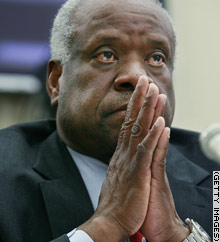Justice Clarence Thomas wrote the majority opinion in an important death penalty case.
Justices rule against killer on Arizona's death row
POSTED: 2:40 p.m. EDT, May 14, 2007
Story Highlights
• Supreme Court splits 5-4 on important death penalty case• Justice reject killer's claim his lawyers didn't do enough to save him
• Jeffrey Landrigan has two murder convictions
• He told judge during death penalty phase to "bring it on"
CNN Washington Bureau
WASHINGTON (CNN) -- The Supreme Court once again split 5-4 on an important death penalty case on Monday, with a majority of conservative justices rejecting an Arizona killer's claims his legal team did not do enough to keep him off death row.
Jeffrey Landrigan refused to allow his attorneys to present "mitigating evidence" at sentencing that could have spared him lethal injection. He later claimed on appeal that his legal team should have realized he was not mentally capable to make such decisions.
An Arizona trial judge made a "reasonable" determination that Landrigan's refusal to allow the evidence should have been respected, the high court concluded.
"Landrigan's mitigation evidence was weak, and the post-conviction court was well acquainted with Landrigan's exceedingly violent past and had seen first hand his belligerent behavior" during sentencing, Justice Clarence Thomas wrote. He was supported by Chief Justice John Roberts and Justices Antonin Scalia, Anthony Kennedy, and Samuel Alito.
Kennedy again provided the swing vote on the always contentious issue of capital punishment, this time favoring the state.
Landrigan has a lengthy criminal record. He was convicted of second-degree murder in Oklahoma in 1982. Four years later, while in prison for that crime, he repeatedly stabbed a fellow inmate, and time was added to his sentence.
In 1989, he escaped from custody and traveled to Arizona. A month later and after a night of heavy drinking, according to court records, Landrigan strangled Chester Dyer with an electrical cord.
At sentencing, his lawyers tried to have Landrigan's former wife and his mother testify about his troubled upbringing, which allegedly led to severe mental problems as an adult. But Landrigan interrupted his defense team repeatedly, making it clear he did not want anyone to testify on his behalf.
Judges and juries consider both "aggravating" evidence presented by the state, and "mitigating" evidence presented by the defense when weighing whether an already convicted murderer deserves the death penalty.
Thomas wrote that an appeals court that found in Landrigan's favor overlooked his final statement to the sentencing court: "I think if you want to give me the death penalty, just bring it on. I'm ready for it."
Thomas said the statement showed Landrigan "clearly understood the consequences of telling the judge that as far as [he was] concerned, there were no mitigating circumstances of which [the judge] should be aware," Thomas wrote.
On appeal, Landrigan tried to argue that his lawyers failed to investigate the "biological component" of his violent behavior, and that they failed to explain fully the consequences of refusing to allow others to testify on his behalf. If he had known, Landrigan claimed, he would have agreed to evidence being presented that he allegedly suffered from fetal alcohol and drug syndrome, and that he inherited his violent tendencies from his biological father.
In dissent, Justice John Paul Stevens sharply rebuked his conservative colleagues.
"The court thoroughly misrepresents [Landrigan's] mitigating evidence," he wrote. "It is all too easy to view [his] mitigating case as 'weak' when you assume away his most powerful evidence ... organic brain disorder, which would have explained not only his criminal behavior but also the repeated outbursts at sentencing."
Such evidence, Stevens noted, "was unknown at the time of sentencing." He also criticized Landrigan's defense attorneys for their "deficient performance" during the sentencing phase. Stevens was supported by Justices David Souter, Ruth Bader Ginsburg, and Stephen Breyer.
Kennedy has proven decisive in several capital appeals argued before the justices this year. In March, he helped lead a 5-4 majority of the bench throwing out the death sentences of three Texas prisoners, finding fault with the state's jury instruction procedures, which he said unfairly hamstrung defendants.
But the 70-year-old justice supported fellow conservatives Roberts, Scalia, Thomas, and Alito when ruling 5-4 for the state in capital cases from Florida and California. He has also joined the right-leaning members in most capital cases, by rejecting last-minute requests for stays of execution that arrive on a weekly basis to the Supreme Court.
The high court's ruling in the Landrigan case means the state's plans for execution can proceed, a process that will take at least several months. Further appeals by the prisoner are expected to delay matters even longer.





No comments:
Post a Comment